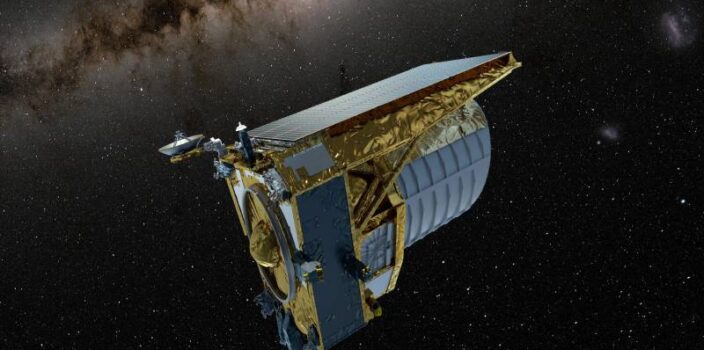After a challenging start to its six-year mission, the Euclid space telescope is concluding its commissioning phase on a positive note. The European Space Agency (ESA) recently announced that thanks to a clever software patch, the telescope’s Fine Guidance Sensor issues have been resolved, allowing it to enter the final testing phase in full science mode.
Euclid, launched by ESA on July 1, is tasked with exploring the mysteries of the “dark universe,” which includes regions of the cosmos composed of dark energy and dark matter. However, the initial months of its mission were marked by difficulties.
The telescope’s fine guidance sensors occasionally lost track of guide stars, which are essential for precisely pointing the mission toward cosmic regions of interest. This problem was caused by cosmic rays, particularly high-energy radiation from solar flares emanating from the Sun, leading to false signals in Euclid’s observations. These false signals sometimes outnumbered real stars, making it challenging for the telescope to resolve star patterns necessary for navigation.
The image above is a result of Euclid’s difficulty in locking onto a position while observing a field of stars. Instead, it captured swirling star trails as it attempted to focus on its intended target.
The ground-based team developed a software patch for Euclid to address the issue. Micha Schmidt, Euclid spacecraft operations manager, explained that they meticulously tested the software update under actual flight conditions with realistic input from the Science Operations Centre for observation targets. With successful testing, the green light was given to proceed with the Performance Verification phase.
The Euclid telescope can now undergo testing in space while in science mode, a crucial step that will continue until late November. Afterward, the mission will commence its primary objectives. ESA’s director of science, Carole Mundell, expressed excitement about this phase, stating that they look forward to the first images that will revolutionize our understanding of the dark universe.
Disclaimer: The views, suggestions, and opinions expressed here are the sole responsibility of the experts. No Echo Gazette journalist was involved in the writing and production of this article.



